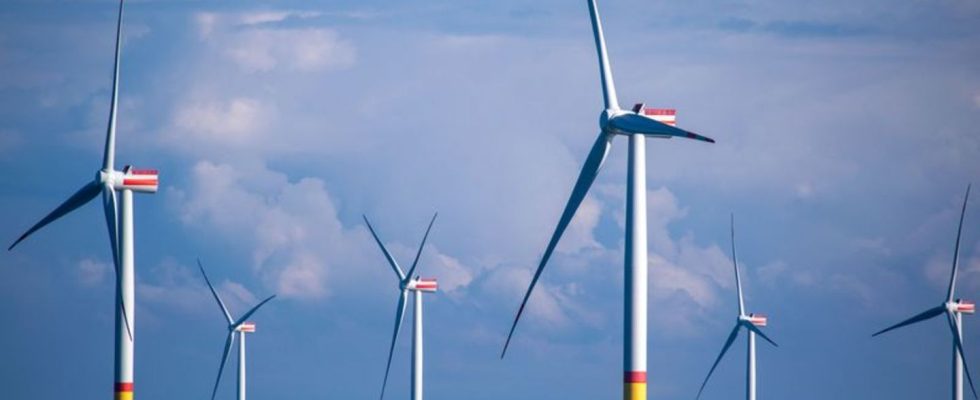Environment
An expensive day for offshore wind power
A working ship brings fitters to wind turbines located in the Baltic Sea between the islands of Rügen and Bornholm (Denmark). photo
© Jens Büttner/dpa-Zentralbild/dpa
It is a premiere: For the first time in Germany, companies are paying for the right to build wind farms in the North and Baltic Seas. The proceeds of the auction will benefit electricity customers.
It’s a historic moment for the expansion of wind power in Germany – and good news for electricity customers: For the first time, the Federal Network Agency has auctioned off four sites for offshore wind farms in the North Sea and Baltic Sea, generating proceeds of 12.6 billion euros. This was announced by the supervisory authority in Bonn on Wednesday. After all, 90 percent of the money raised is to be used to reduce electricity costs. 5 percent each flow into marine nature conservation and the promotion of environmentally friendly fishing.
“The results confirm the attractiveness of investments in offshore wind energy in Germany,” said the President of the Federal Network Agency, Klaus Müller. “The competition for offshore wind energy is higher than ever.” Successful bidders ended up being the mineral oil companies BP and Total Energies, which each secured two areas.The commissioning of the wind farms is scheduled for 2030.
It was the first time that the Federal Network Agency used an auction to determine which companies were allowed to set up a wind farm. Three areas for wind farms with a capacity of 2000 megawatts each in the North Sea and one area for a wind farm with a capacity of 1000 megawatts in the Baltic Sea near Rügen were auctioned.
Seven gigawatts in one fell swoop
The auction that has now been completed was remarkable given the size of the planned wind farms. In one fell swoop, 7 gigawatts of capacity were put out to tender – enough to almost double the current offshore capacities in Germany. According to the consulting firm Deutsche Windguard, 1,539 offshore wind turbines with a total output of 8.1 gigawatts were in operation in Germany at the end of 2022.
The auction process, which had not previously been practiced for offshore wind power, was made possible because there were several bids for all four areas in which the bidders waived the long-established support for the construction of wind farms from the outset. There were eight interested parties for each of the areas in the North Sea and nine applicants for the area in the Baltic Sea.
The billions in proceeds from the auction are good news for electricity customers. Because the majority of the money is to be used to finance the necessary grid expansion and thus ultimately reduce the electricity costs of consumers.
Just a drop in the ocean
However, consumers should not expect too much relief in electricity prices from the proceeds from the auction. Because in view of the estimated network expansion costs of over 100 billion euros, the billions in proceeds from the campaign are more of a drop in the bucket, said an expert. In addition, the electricity cost reduction component is paid in 20 annual installments.
According to many experts, the outcome of the bidding process is a promising signal for the future of wind power in Germany. “The results are an important step towards achieving the offshore expansion target of 30 gigawatts by 2030,” emphasized the Head of the Network Agency. The managing director of the Federal Association of Offshore Wind Farm Operators (BWO), Stefan Thimm, also judged that the investments are of enormous importance for the expansion of renewable energies and for achieving the climate policy goals of the federal government. BP manager Anja-Isabel Dotzenrath spoke of a “major milestone for BP’s decarbonization plans in Germany”.
The energy expert Dominik Hübler from the consulting company Nera told the German Press Agency that the outcome of the auction was a “strong signal” for how attractive the German market is considered. He emphasized that 12.6 billion euros is a lot of money. But it always depends on the alternatives. If you compare that to the cost of developing an oil field in the arctic ice, the sum isn’t that high.
The German Environmental Aid spoke of a breakthrough for offshore wind energy. Renewable energies would become a sure-fire success. For the first time, project sponsors paid to be able to build offshore wind turbines.
Criticism came from the manufacturers of the systems. According to the mechanical engineering association VDMA Power Systems, the surcharge values show that offshore wind energy can drastically reduce the costs of electricity generation. “However, the bidding component and the dynamic bidding process in the tender design leave too little scope for earnings from the manufacturing offshore wind industry,” criticized Managing Director Dennis Rendschmidt. The Federal Government’s adherence to negative bids at the expense of the offshore wind industry is wrong. Further investments are necessary to achieve the expansion targets. The “WindSeeGesetz” must therefore be amended “as soon as possible”.

